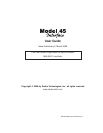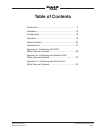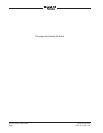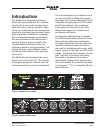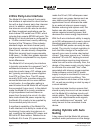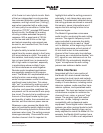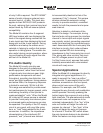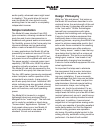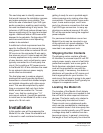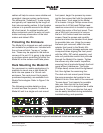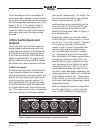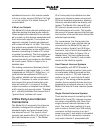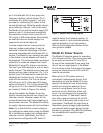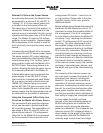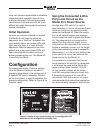
Issue Preliminary 2, March 2009 Model 45 User Guide
Page 6 Studio Technologies, Inc.
2-Wire Party-Line Interface
The Model 45’s two-channel 2-wire party-
line interface is optimized for direct connec-
tion with a dual-channel party-line intercom
circuit. In addition, single-channel party-
line intercom circuits can also be connect-
ed. Many broadcast applications use the
dual-channel TW-series from RTS®, which
includes their popular BP325 belt pack. The
Model 45’s 2-wire interface is configured for
a –10 dBu nominal level, exactly matching
the level of the TW-series. Other industry-
standard single- and dual-channel party-
line intercom systems, including those from
Clear-Com®, are also directly compatible.
While their nominal level is approximately
4 dB lower (–14 dBu) their greater dynamic
range tends to compensate for any opera-
tional differences.
The Model 45’s 2-wire party-line interface
is typically connected to a powered (“wet”)
unbalanced intercom circuit. Powered
party-line circuits have a DC voltage pres-
ent, typically provided by power supplies
from RTS or Clear-Com. This DC power,
normally 30-32 volts, provides energy for
connected devices such as user stations
or belt packs. A configuration setting is
used to select how the Model 45 will impact
the connected 2-wire circuit. In the default
mode the Model 45’s circuitry maintains
a high-impedance load and draws no
power from the party-line circuit. An alter-
nate mode allows the power required by
the Model 45’s circuitry to be supplied by
the connected party-line circuit.
A significant capability of the Model 45’s
2-wire interface is its ability to create a fully
functioning 2-wire party-line intercom cir-
cuit, supplying the required DC power and
200 ohm AC terminations. Referred to as
the Model 45’s 2-wire (PL) power source
mode the 30 volt, 300 milliampere maxi-
mum output can power devices such as
user stations and belt packs. In many
applications this will eliminate the need
for an external intercom power supply.
Besides reducing total system cost, this
feature can also lower system weight,
reduce required mounting space, and
decrease the mains energy requirement.
With the 2-wire interface’s ability to supply
up to 300 milliamperes of current a typical
broadcast application which uses two or
three BP325 belt packs can easily be sup-
ported. The circuitry’s output regulation is
such that little change in the output volt-
age will occur over its entire rated output
current. The power source is an “industry-
standard” 30 volts DC, helping to ensure
that applications requiring long intercom
cable runs will function correctly. Also, the
design of the power supply circuitry helps
to minimize the noise and “hiss” often
associated with intercom power supplies.
Under software control the DC power
supply’s output is monitored for over-cur-
rent and short-circuit conditions. This
allows protection shut-down of the output
DC, as well as providing an alert by way of
a visual indicator.
An auto terminate function ensures that
should a party-line circuit not be connect-
ed, the Model 45’s interface circuitry will
remain stable. This unique feature makes
certain that objectionable audio signals,
such as oscillations and “squeals,” will
rarely be sent to the connected 4-wire
device.
Analog Hybrids with Auto
Nulling
A key reason that the Model 45 achieves
excellent audio performance is the design



